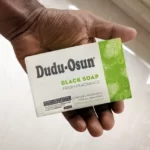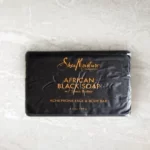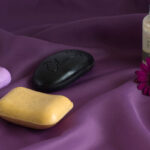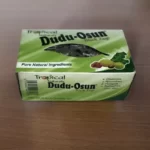Now Reading: My Honest Review of Era of Nature African Black Soap (2025)
-
01
My Honest Review of Era of Nature African Black Soap (2025)
My Honest Review of Era of Nature African Black Soap (2025)

This post may contain affiliate links. Please read our full disclosure here.
When I first came across Era of Nature African Black Soap, I was intrigued by its reputation for being both deeply cleansing and completely natural. I’ve used various versions of African black soap over the years, but this one stood out because of its raw, unrefined presentation and the brand’s promise of ethical sourcing straight from Ghana. What I quickly realized after using it is that this is not a regular soap bar—it’s an authentic, traditional skincare tool that requires a bit of care and understanding. Depending on your skin type, it can be a game changer or a bit too intense.
From the start, Era of Nature’s African Black Soap felt like a product crafted for those who value purity over polish. Everything about it—from the earthy scent to the way you have to slice it before use—makes it feel like a genuine handmade creation. But it also comes with certain quirks that make it less convenient than mass-market soaps, so I’ll share both the pros and the drawbacks I experienced.
Packaging
Era of Nature’s approach to packaging is refreshingly minimalist. Some sizes of the soap come wrapped in simple plastic wrappers, which helps protect the product while still staying true to a low-waste philosophy. Smaller options—like the 0.5 lb or 1 lb bars—may arrive in basic Kraft-style paper packaging, while the larger 2 lb blocks are often sold as raw, unboxed chunks or wrapped in just enough protective material to keep them intact. This fits well with a brand that promotes sustainability and zero-waste values.
At first, I found the plain presentation surprising—there are no glossy boxes or decorative elements—but I grew to appreciate it over time. The unrefined look complements the brand’s natural philosophy; it feels raw, unpretentious, and genuine. The trade-off, however, is limited on-package information. Essential details like the ingredient list, usage tips, and skin-type guidance are kept minimal and are better explored on their website, which offers clear FAQs and directions.
One functional note: because this soap typically comes in a large block form, you’ll need to cut or slice off smaller pieces for everyday use. It can be crumbly by nature, so the process sometimes gets messy. I learned quickly that using a clean, dry knife works best. While it may add a bit of effort, this hands-on step makes the experience feel more personal—almost like working with a handcrafted natural material rather than a commercial product.
Ingredients
The ingredient list is refreshingly short and simple: unrefined shea butter, coconut oil, palm kernel oil, cocoa pod ash, and distilled water. Some batches may also include plantain skin ash, another hallmark of traditional African black soap. All ingredients are vegan, cruelty-free, and directly sourced from Ghana, where the soap is handmade using age-old techniques.
What sets this formulation apart is what it doesn’t contain—no sulfates, parabens, artificial fragrances, or preservatives. This makes it ideal for people like me who try to avoid harsh additives. However, it’s important to understand the science behind it: African black soap is naturally alkaline, often with a pH that ranges between 8 and 12. While this alkalinity gives it its powerful cleansing ability, it can also disrupt the skin’s acid mantle, especially if you already have dry or sensitive skin. That’s why the brand repeatedly emphasizes the importance of moisturizing immediately after washing.
The unrefined shea butter adds a touch of moisture, while the cocoa pod ash acts as a natural exfoliant and source of potassium hydroxide, essential for the soap-making process. Overall, the formula stays true to the traditional roots of African black soap—pure, raw, and without any unnecessary embellishments.
Scent
Era of Nature’s African Black Soap is officially listed as fragrance-free, and that’s accurate—it doesn’t contain any added perfume or essential oils. But “fragrance-free” doesn’t mean scentless. The soap carries a distinct, earthy aroma that comes directly from its natural ingredients. To me, it smells like a mix of roasted cocoa, smoke, and damp soil—a scent that instantly feels natural and grounding.
It’s not a “pleasant perfume” type of scent, but rather an authentic, rustic smell that reinforces the product’s handmade identity. The aroma doesn’t linger on the skin after rinsing, which I actually appreciate—it feels clean without being perfumed. People who are sensitive to synthetic fragrances will likely enjoy this quality, while those expecting a floral or citrusy soap might find it too raw or unfamiliar.
Lather and Application
Despite its rough appearance, this soap lathers beautifully once you know how to use it. The key is not to rub the bar directly on your skin. Because it contains natural ash particles, it can feel slightly abrasive and even scratchy if applied directly. Instead, I follow the brand’s directions: I rub a small piece between my hands or on a washcloth to create a creamy, stable lather, then apply that foam to my face or body.
The lather feels rich and purifying, with small bubbles that spread easily. It rinses off cleanly, leaving behind that unmistakable “squeaky clean” sensation. However, this is where you need to be cautious—the same deep-cleansing effect that makes it feel so refreshing can also make your skin feel tight right after rinsing. I never skip moisturizer afterward. Without that extra hydration, it can feel a bit too drying, especially on my face.
This methodical approach to application—lather first, never apply directly, and moisturize after—is essential for the best experience. Once I got used to it, it became second nature, and I found it quite satisfying in a “back-to-basics” kind of way.
Effectiveness
In terms of performance, Era of Nature’s African Black Soap delivers exactly what it promises: deep cleansing and clarifying results. It’s especially effective on acne-prone or oily skin, which is where it shines. After a few weeks of use, I noticed fewer clogged pores and a smoother skin texture, especially on my back and shoulders. It truly strips away oil and grime more thoroughly than any commercial body wash I’ve tried.
However, it’s not a one-size-fits-all solution. If your skin is dry, sensitive, or already irritated, this soap can be too strong. On certain days when my skin barrier felt compromised, it left me with mild flakiness and tightness, even after moisturizing. That said, when used sparingly or a few times a week, it can work beautifully as a clarifying treatment rather than a daily cleanser.
The brand also claims it can help with eczema, psoriasis, and dark spots, and I believe that’s plausible. Its gentle exfoliation helps speed up skin turnover, which can gradually fade post-acne marks or surface pigmentation. Its antibacterial properties—backed by studies on traditional African black soap—make it a solid option for body acne and odor control as well.
Overall, I’d describe this as a powerful natural cleanser with visible results for oily and resilient skin types, but a product that demands respect and moderation for everyone else.
Size and Lifespan
One of the biggest surprises for me was how long this soap lasts. The brand sells it in generous blocks—typically 8oz, 16oz, or even 2lb sizes—and even the smallest size lasted me several months with regular use. I read reviews where users claimed their 16oz block lasted over a year, and after my experience, I can believe it.
Because the soap is dense and you only use small cut pieces at a time, it hardly diminishes. This longevity makes it much more economical than it first appears. While the initial price might seem high, the cost-per-use ends up being impressively low. Just make sure to store it in a dry soap dish or airtight container, as the soap can soften or dissolve if left in water for too long.
Another plus is its biodegradability. With no synthetic chemicals or preservatives, it’s environmentally safe, which adds to its appeal. You can also use it in multiple ways—not just for the body, but even as a clarifying shampoo (though I always follow with conditioner when I do this).
Brand Reputation
Era of Nature is a relatively young brand, founded in 2016, but it’s already built a loyal following. The founder’s story—creating natural remedies after struggling with their own skin problems—feels genuine and aligns well with the brand’s mission of “remedying ailments the way nature intended.” The company emphasizes its ethical sourcing, using traditional Ghanaian methods and providing jobs to local villagers through its small factory there.
Customer reviews are overwhelmingly positive. On their website, the soap holds a 4.6 out of 5 average from hundreds of users, with many noting improvements in acne and skin texture. On other platforms like Walmart, it’s rated even higher. While it hasn’t received major beauty awards, its reputation in the natural skincare community is strong, largely because it delivers results for those who understand how to use it correctly.
What I personally respect most is the brand’s cruelty-free and vegan commitment. They clearly state that no animal testing is involved, and the product is made entirely from plant-based ingredients. Combined with their fair trade efforts in Ghana, Era of Nature comes across as a company that truly practices what it preaches.
Price and Value
The price varies depending on where you buy it. On the official Era of Nature website, the 8oz block sells for around $19.99, while a 16oz block on Walmart costs roughly $13.74—a much better deal. At first glance, this might seem expensive for a single soap bar, but considering how slowly it wears down, it actually turns out to be one of the most cost-effective soaps I’ve tried.
The brand also offers discounts for first-time buyers (like 20% off with the code FIRST20) and subscription options for repeat customers. When you factor in its longevity, the natural formulation, and the brand’s ethical practices, the price feels fair. For me, it’s one of those products where the value isn’t just in the product itself, but in the philosophy behind it.
Availability
Era of Nature’s African Black Soap is primarily sold online, which makes it easily accessible no matter where you live. You can buy it directly from the brand’s website or through major marketplaces like Walmart and Amazon. I personally ordered mine online, and the shipping was quick, with the product arriving securely wrapped.
I haven’t seen it in physical retail stores like Whole Foods or Target, so online is definitely the way to go. The brand also frequently restocks and even offers bulk options, which is great for those who use it regularly or share it with family members.
Overall Rating
If I had to summarize my experience, I’d say Era of Nature’s African Black Soap is not for everyone—but perfect for the right user. It’s a powerhouse of natural cleansing that genuinely improves skin clarity and texture if you use it properly and follow up with moisturizer. It embodies authenticity in every sense, from its raw form to its ethical origins.
I’d rate it 8.6 out of 10 overall. I love its purity, longevity, and honest craftsmanship, but I also recognize that it’s a bit too strong for delicate skin types. It’s the kind of product that rewards mindfulness—when used with care, it can become a staple in a natural skincare routine.
For those who appreciate truly raw, handmade products that align with eco-conscious and ethical values, Era of Nature African Black Soap is absolutely worth trying.
Era of Nature African Black Soap
- Made with 100% natural, vegan, and cruelty-free ingredients.
- Ethically sourced from Ghana with fair trade principles.
- Exceptionally long-lasting and economical over time.
- Deeply cleansing and clarifying for oily and acne-prone skin.
- Minimal packaging and biodegradable formula.
- Can be too drying for sensitive or dry skin types.
- Crumbly texture requires extra care when slicing and storing.
- Not suited for direct application; needs to be lathered first.
- Earthy scent might not appeal to those preferring fragranced soaps.











